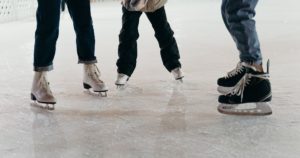Tips For Staying Safe This Winter
January 11, 2023 According to the Consumer Product Safety Commission (CPSC), emergency room staff treated 110,900 individuals for winter activity-related injuries they sustained in 2021. Many of the injuries involved activities such as sledding, skiing, ice skating, riding snowmobiles, and playing sports like ice hockey. To prevent accidents like these from happening, we have compiled some of the CPSC’s useful tips for ways to safely enjoy wintertime activities below.
According to the Consumer Product Safety Commission (CPSC), emergency room staff treated 110,900 individuals for winter activity-related injuries they sustained in 2021. Many of the injuries involved activities such as sledding, skiing, ice skating, riding snowmobiles, and playing sports like ice hockey. To prevent accidents like these from happening, we have compiled some of the CPSC’s useful tips for ways to safely enjoy wintertime activities below.
Winter Activity-Related Injuries: Fast Facts
The CPSC reports that of the 110,900-winter activity-related injuries, 51.44% involved skiing, 15.49% involved ice hockey, 15.45% involved toboggans, sleds, and snow discs, 12.64% involved ice skating, and the remaining 4.96% involved snowmobiles. In addition to these injuries, the CPSC received reports on 4,200 snow blower-related injuries that required emergency medical care that same year. Of all the injuries, more than 40% involved the wrist, hand, and/or finger(s).
Winter Sports Safety Tips
The CPSC strongly urges anyone participating in winter sports, like ice hockey, skiing, or even going sledding or tobogganing to wear an appropriate helmet. Wearing a properly fitted helmet significantly reduces the risk of sustaining head injuries, which include:
- Concussions
- Traumatic brain injuries, or TBIs
- Skull fractures
- Intracranial hematomas (ICHs)
- Scalp wounds
People of all ages should wear helmets when participating in wintertime sporting activities. You can learn more about which helmet is the best to wear for each activity by visiting this resource page.
Snow Blower Safety
It is critical to use caution when operating a snow blower. The CPSC recommends taking the following steps to reduce hazards:
- Turn the machine off and use a cleanout tool or a long stick – NEVER use your hands — to unclog wet debris and/or snow from the snow blower
- Never leave a gas-powered snow blower running in an enclosed area. The exhaust fumes from gas-powered snow blowers contain carbon monoxide, which can silently kill a person in just minutes
- Do not add gasoline to a hot or running engine. Adding gasoline to a running or hot engine creates fire hazards
- Keep gasoline for snow blowers in a portable, designated gasoline container with child-resistant closure to prevent accidental and potentially fatal child poisonings
Remember to Check for Product Recalls
No matter if a winter-related product is old or new, it is important to check for recalls before using it. You can refer to the CPSC’s website to determine if your product is under recall. The agency also recommends that consumers fill out and send in registration cards that come with new products or to register the product on the firm’s website so that companies know the best method of contacting you in case a recall does occur.
When to Contact an Attorney
Some individuals sustain winter-related activities due to another party’s negligence. Some examples of this include if a product, like a snow blower, is defective or fails to provide adequate instructions and/or warnings for consumers or if a skier sustains injuries on the slope due to the failure of the resort owner to safely maintain the property. At Galfand Berger, our attorneys are experienced at handling premises liability, personal injury, and products liability matters on behalf of injured clients. If you have questions about filing a legal claim for your injuries, someone at our firm can help. To learn more, contact a representative online now.
Philadelphia Personal Injury Lawyers at Galfand Berger, LLP, Representing Injured Victims Since 1947
If you have a question about filing a legal claim, contact the Philadelphia personal injury lawyers at Galfand Berger LLP today. Call us at 800-222-USWA (8792) or fill out our online form for a free consultation. Located in Philadelphia, Bethlehem, Lancaster, and Reading, we serve clients throughout New Jersey and Pennsylvania, including Allentown and Harrisburg.
 Google Screened
Google Screened
